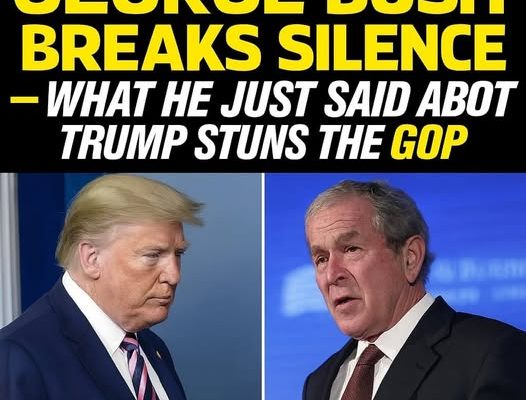In a rare show of bipartisan unity, former presidents George W. Bush and Barack Obama have spoken out together to condemn what they call the dismantling of one of America’s most vital humanitarian institutions — the U.S. Agency for International Development (USAID). The criticism centers on President Donald Trump’s decision to drastically scale back the agency’s overseas programs, a move the two former presidents say jeopardizes both global stability and U.S. credibility abroad.
The remarks came in a recently released video featuring Bush, Obama, and U2 frontman Bono — a long-time advocate for international development and HIV/AIDS relief. The video paid tribute to USAID employees whose positions were eliminated or transferred after the administration’s sweeping reorganization of the agency earlier this year.
Bush Breaks His Silence
George W. Bush, who has largely avoided public clashes with Trump since leaving office in 2009, used the occasion to deliver one of his most direct rebukes yet. Addressing USAID staff, Bush praised their decades of work fighting AIDS and HIV in Africa — efforts that began under his administration with the President’s Emergency Plan for AIDS Relief (PEPFAR). The program has been credited with saving roughly 25 million lives over the past two decades.
“You have demonstrated the great strength of America through your efforts — and that is your compassionate spirit,” Bush said, as reported by the Associated Press. “Is it in our national interest that 25 million people who might have died are now alive? I believe it is — and so do you.”
For Bush, who built much of his foreign policy legacy on global health and development, Trump’s decision struck at the heart of what he considers a moral and strategic duty. His words echoed his long-standing belief that foreign aid is not charity but a pillar of American security — a way to strengthen fragile nations, counter extremism, and project values rather than merely power.
Obama Calls It a “Calamity”
Barack Obama, speaking in the same video message, was even more direct. Calling Trump’s reduction of USAID’s footprint “a calamity,” he described the move as a betrayal of decades of bipartisan investment in global development.
“Dismantling USAID is a disgrace and a calamity,” Obama said. “It represents some of the most critical work being done anywhere in the world.” He labeled Trump’s action “a monumental error” and predicted that “eventually, leaders from both parties will come to understand how essential you are.”
During his presidency, Obama had expanded many of the initiatives Bush started, arguing that development was an integral part of national defense and diplomacy. Programs targeting disease eradication, food security, and education had become key instruments of soft power under both administrations. Their elimination, Obama warned, would not only harm vulnerable communities abroad but also diminish America’s influence at a time of growing global competition.
The Administration’s Rationale
Trump, however, framed the decision differently. Working in partnership with billionaire entrepreneur Elon Musk and the newly established U.S. Department of Government Efficiency, the administration moved to fold most of USAID’s functions into the State Department. Officials described the step as part of a broader effort to “drain the swamp” of what they characterized as decades of waste, fraud, and political bias within federal agencies.
Musk, a vocal supporter of the reorganization, described USAID as “a viper’s nest of radical-left Marxists who despise America.” His comments reflected a growing sentiment among Trump allies that U.S. development programs had become overly politicized and were being used to advance agendas unrelated to core American interests.
The New York Post reported that the State Department completed the integration earlier this week, leaving only a skeleton crew in place to wind down ongoing operations.
Marco Rubio Defends the Cuts
Secretary of State Marco Rubio, who oversaw the transition, countered Bush and Obama’s criticism by portraying the move as necessary reform. “Aside from establishing a global NGO industrial complex at taxpayer expense, USAID has little to show since the end of the Cold War,” Rubio said during a press briefing. “Development goals have seldom been achieved, instability has often worsened, and anti-American sentiment has grown.”
Rubio argued that by centralizing foreign assistance under the State Department, the administration could ensure that aid directly serves U.S. national priorities. “This period of government-sanctioned inefficiency has officially concluded,” he said. “We will finally have a foreign funding mission that prioritizes American interests, delivers measurable outcomes, and holds partners accountable.”
He added that the new structure would prevent duplication of efforts, reduce overhead costs, and eliminate what he called “decades of bureaucratic drift.” Beginning July 1, all foreign assistance programs consistent with administration policy would be managed by the State Department “with greater accountability, strategy, and efficiency.”
The Clash of Visions
The public disagreement between Bush, Obama, and Trump highlights a stark philosophical divide over how America should engage with the world. For Bush and Obama — leaders from opposing parties but overlapping worldviews — foreign aid represents the compassionate face of U.S. power. Both men view it as a moral responsibility that strengthens global stability and advances long-term national interests.
Trump and his supporters, by contrast, see much of the foreign-aid apparatus as bloated and misaligned with domestic priorities. They argue that taxpayer money should serve tangible national benefits, not fund what they describe as “global social engineering.”
That ideological split is not new, but it has rarely been expressed so clearly by former presidents standing together against a sitting one. Political analysts say the episode underscores how dramatically the Republican Party’s foreign-policy stance has shifted in recent years — from Bush’s internationalism to Trump’s “America First” populism.
A Legacy in Question
For Bush, the dismantling of USAID threatens a legacy he has long championed. PEPFAR, launched in 2003, was one of the most ambitious health initiatives ever undertaken by any nation, providing billions in funding for HIV/AIDS prevention and treatment across Africa and beyond. Even critics of his foreign policy have praised that achievement.
“George W. Bush saved more African lives than any American president in history,” said one former USAID official now based in Nairobi. “To see those programs dismantled is heartbreaking.”
Obama’s words carried a similar tone of loss — not just for humanitarian workers but for America’s reputation as a leader in global problem-solving. “Our generosity has always been one of the strongest tools of our diplomacy,” he said. “When we retreat from that, we don’t just turn our backs on others — we weaken ourselves.”
The Future of U.S. Development
As the transition continues, uncertainty looms over thousands of employees and hundreds of partner organizations worldwide. Some expect that critical initiatives — including those on malaria prevention, food security, and education — may either shrink or disappear entirely. Others believe a leaner model could emerge, integrating aid more directly into strategic diplomacy.
Still, for many inside the development community, the tone of Bush and Obama’s remarks served as a rare affirmation. Their joint appearance reminded Americans that humanitarian work once commanded broad bipartisan support — an era when saving lives overseas was seen not as partisanship, but as leadership.
Whether the United States will return to that vision remains unclear. What is certain is that two former presidents, separated by ideology but united by conscience, have found common ground once more — standing together in defense of a principle they both believe defines America at its best: the conviction that helping others strengthens us all.


